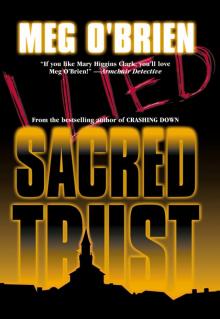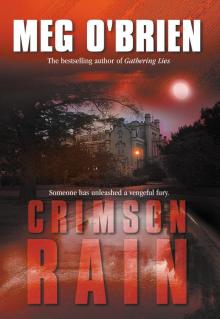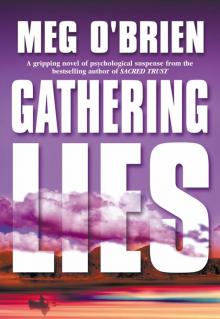- Home
- Meg O'Brien
Gathering Lies Page 2
Gathering Lies Read online
Page 2
I’d become an overnight sensation—the Great White Hope of a New York publisher threatened with potential bankruptcy and unprepared for the advent of on-line publishing, e-books, print on demand. Rife with paranoia, they’d already dumped most of their mid-list writers, and were placing all their bets on a hot new blockbuster.
My book, someone high up had decided, would be blockbuster enough to hit the New York Times bestseller list.
And I hadn’t yet written a word.
As for Timothea, it did not surprise me that she’d turned her B&B into a writer’s colony. It was Timothea who first inspired me to write, sitting at her cherry-wood dining room table in the big white house, while everyone else was out on the beach or hiking around the island.
Tiny and remote, there was never much to do on Esme Island but swim and hike. I’d linger behind, my nose in a book, and one day Timmy—as she asked me to call her—sat me down with a pad and pencil and told me to write. She saw something in me back then, something I was too absorbed in being a teenager to see.
Later, when I took legal writing in law school, I began to recognize a few stirrings of potential in that direction. It wasn’t until after the arrest last January, however, that I seriously thought of becoming a scribbler for a living.
A ludicrous thought, an oxymoron for most struggling authors—writing for a living. But once convicted and sentenced for drug possession—if that was the way it turned out at trial—there was little chance I’d ever be a lawyer again.
Some days, at least when the sun shines, I sit here in the bay window of my parents’ house, at my father’s desk, and look out at ships going by on Puget Sound. Before me is the Space Needle, high-rise apartment buildings, sparkling blue water and islands with lush green forests. A halcyon scene. A scene I grew up loving, with great hopes to one day be part of it, to leave my mark on it, doing nothing but good.
How then, could things have gone so wrong?
Fresh out of law school fifteen years ago, at twenty-five, I still had some of those wildly heroic ideas law students get about saving the world. Growing up, I’d watched my father defend corporate raiders and tax cheaters at Sloan and Barber. It was always expected I’d follow in his footsteps. Then, as children will, I’d opted to do the opposite with my fine new degree and become a public defender.
This was not entirely to spite my father, who had hoped I’d one day be a partner at Sloan and Barber, a daughter he could show off at the country club, since he’d never had a son. I actually considered S&B for a while, but in law school I’d begun to hear about innocent people who’d been jailed for crimes they didn’t commit. Many lingered in prison ten, twenty years, while life outside the walls passed them by. Their children grew up, their wives or husbands moved on.
It was something that saddened and even frightened me. The idea that someone who had done nothing wrong could be yanked from his or her home, charged with a crime, and sent to prison for years—even life—sent chills down my spine. It smacked of Nazism, innocent people being dragged off into the night. I think this frightened me because I knew that if it could happen to one, it could happen to all.
My fear was theoretical in nature, back then. I couldn’t have known that one day it would happen to me. Unless, of course, it’s true that we come in “knowing” at some level what our life will be—thus explaining, for some, the kind of choices we make.
It was the advent of DNA as a means of identification in criminal cases that finally freed me of some of those fears. DNA had been discovered in 1870 by a chemistry student named Friederich Miescher, but no one realized its full potential back then. It wasn’t until the 1950s that deoxyribonucleic acid was discovered to carry genetic material from one generation to the next. Now, as everyone knows who watched the O.J. trial, it’s commonly used in criminal cases, much like fingerprints, to prove a person guilty or not. It can be obtained from something as simple as a swab of fluid from inside a cheek, or a hunk of hair.
Any prison inmate who’s been jailed wrongly can afford a lock of hair. What most can’t afford is a lawyer to fight the good fight. Someone needs to get a new trial going. Tests must be run, and DNA experts persuaded to testify pro bono—free of charge. Sometimes agencies such as the American Civil Liberties Union will help with the cost. However it’s done, it must be proved that the killer’s or rapist’s DNA, found on or near the victim, in no way matches the client’s—the wrongly accused perpetrator of the crime.
The plight of these wrongly accused became a moral crusade for me. During my last year of law school, I made the decision to shun the big fees my father assured me I could be making within a few years at Sloan and Barber. Instead—I announced with all the exuberance of naive youth—I would defend the poor and downtrodden.
Little did I know that within fifteen years, I’d be one of Seattle’s poor and downtrodden.
An exaggeration, of course. I tend to do that on days like today when everything seems so black. Still, when I was brought up on charges five months ago, I lost my job, and it looked for a while as if I’d be joining my clients on the streets. If my father hadn’t died of a heart attack, leaving me a modest inheritance, and if my mother hadn’t moved to Florida, leaving her house vacant, that’s precisely what might have occurred.
And there again we have one of life’s little tricks—it takes away the people you love, and replaces them with assets.
So what do you do? Do you say, “Go away, Life, I don’t want your filthy lucre”? I think not. Not, at least, when the meter reader is at one’s door.
So I moved into my parents’ house shortly after the arrest. Then last month, in April, out on bail, I went to Thornberry along with five other women who were invited there, just like me. We were all potential but as yet unpublished authors, and I suspected from the first that each of the others was running from something—also like me.
No one admitted to that, of course. Not at first. It took the quake to make us trust each other enough to share our stories. By then, it was far too late.
Because the time sequence of the two events that changed my life this past year can become confusing, I am writing them down here in much the way I write my notes for a legal brief. Much the way, in fact, that I’m writing the notes for my upcoming trial.
It is early May now. Last January I’d taken on the case of a woman arrested for prostitution. She was middle-aged, black, not particularly attractive—in other words, a piece of meat, nothing more, to the five Neanderthal cops on duty at the jail that night.
The woman was released when the morning shift came on. Five cops from the night shift followed her into an alley and gang-raped her for more than an hour. They used everything on her—nightsticks, guns, themselves. When it was over, Lonnie Mae Brown had just enough strength left to check herself into a hospital, before falling unconscious. When she came to, she refused to report the incident to the cops.
She also refused all tests. She was afraid of retaliation—and I couldn’t dismiss her fears. The rape of women in jail has been common in recent times, as has punishment for anyone who talks. Though Lonnie Mae’s rape had occurred outside in an alley, public outrage about renegade cops was high on the totem pole of police reform. The stakes, for the cops, were high. For that reason, if no other, they tried to make the victim look guilty.
A young, black doctor I knew sized up the situation and called me, thinking that, as a lawyer, I might be able to tell Lonnie Mae what her options were.
Not that she had many, so far as I could see. I was there in the hospital when she woke from a sedative, and the first thing she did was shoot up straight into the air, her eyes wide and on the hunt for tormentors, hands flailing at invisible ghosts.
The most I could do for her was to be honest, since she was refusing the rape tests. I told her as gently as possible that without them, there wouldn’t be enough evidence for the Prosecuting Attorney to press charges. I said if she needed to talk, though, to call me.
I fully expected
never to hear from her again. But three days later, I did. She had decided to file a complaint, she said. Would I go to the station with her?
I was surprised, and I didn’t think it would do her any good. But I agreed. I picked Lonnie Mae up, and stood by her side while the cop taking her complaint had a chuckle or two over her story. He clearly didn’t believe it. Nor did he like the fact that I’d come in with her.
“Look, Counselor,” he said sarcastically, “if this really happened, how come your client didn’t get tested in the hospital?”
“She’s not my client,” I said sharply. “She’s my friend. You just make sure that complaint gets into the right hands.”
I was so angered by his attitude, I took Lonnie Mae home and sat with her, as she cried and wrung her hands.
“I just never thought it would do any good to have them tests,” she said, over and over.
Privately, I thought she’d been in too much shock to make that decision in the hospital. But it was too late for that now, and all I could do was try to comfort her. She seemed to need to lean on me, despite the fact that she hardly knew me. I felt bad for her, and distressed that I couldn’t do more for her. So I made myself available.
Lonnie Mae’s apartment was comprised of two rooms, a miserable little place in the worst part of town. The halls were filled with bums, crack addicts, pimps and rats. In the living room, on a packing crate that had become an end table, were crumpled, un-framed snapshots of a baby and two toddlers. She had lost touch with them over the years, she said wearily. “Social Services took ’em away long ago, and I ain’t seen ’em since then. I signed the papers, you know, for adoption. I figure that’s best. Ain’t no kind of life, livin’ with me.”
Silently, I agreed with her, but it wasn’t my job to judge her worth as a mother. Something in her defeated tone sparked my anger again, however, and with that, I thought of something I stupidly hadn’t considered before.
“Lonnie Mae,” I asked, “where are the clothes you wore during the rape that night?”
“Oh, they’s in the closet, over there,” she said tiredly. “The hospital put them in a bag.”
“May I see them?”
She nodded, and I crossed over to the closet. Opening it, a whiff of cheap, heavy perfume hit my nostrils, almost gagging me. Beneath it was a scent of sweat, a leftover, I assumed, of long nights on the streets, hustling johns in cars and in broken-down hotels.
There was gold in that closet, though. When Lonnie Mae had been picked up for prostitution and gang-raped, she was wearing a fake fur jacket, a red imitation leather skirt, and purple fishnet stockings. It had been three days since then, and she had already showered away any sperm that might have been used as evidence. The clothes she’d worn during the rape, however, were right here where she’d tossed them upon coming home from the hospital. She hadn’t taken them out of the bag, or washed them—and they were loaded with sperm. In particular, the cops hadn’t bothered to remove the fishnet stockings, that night in the alley. They’d torn through them, leaving them tattered around her legs, and in their macho celebration they had been sloppy, spewing DNA around like liquid confetti.
I asked Lonnie Mae if I could take the stockings. I wasn’t sure what I’d do with them, but I told her I was certain they could help. She said sure, and I stuck them in the trunk of my car when I left her that day.
Later that night, Lonnie Mae’s tenement burned to the ground. Dental records identified her body, which had been burned beyond recognition. The fire was thought to be “accidental,” caused by a space heater that tipped over in another apartment. Four other people died that night.
Maybe it was an accidental fire. Certainly, I couldn’t fault the arson investigators, who had a difficult job to do.
In my heart, however, I couldn’t shake my belief that the five cops, or somebody working for them, had had a hand in it. Surely they had been told that Lonnie Mae had filed a complaint against them. They would have been questioned, even if the complaint was not believed. And the accusation, if it developed into an arrest, and then trial, could destroy them. In their minds, the next reasonable step might well be to rid themselves of their accuser. No victim, no arrest. No testimony, no trial.
Maybe they thought, too, that the murder of a prostitute would go unnoticed in a city the size of Seattle. And maybe they thought that by killing Lonnie Mae, they’d be sending a message to me: Back off from this, or we’ll fix you, too.
If so, they really should have known better. Spurred on by both anger and considerable guilt over not protecting Lonnie Mae somehow, I met with a Prosecuting Attorney I had known for years. I posed a hypothetical question: If someone were to come across a piece of evidence that could put some bad cops in jail, what would be the best thing to do with it?
She gave me the party line, of course: If I were that “someone,” as an officer of the court I’d be guilty of obstruction of justice if I didn’t turn over evidence of a crime.
“I didn’t say it was me,” I told her. “What if this someone didn’t trust the authorities? Or the security of the evidence lockers?”
Her name was Ivy, which sounds as if she’d be a soft touch. Ivy O’Day was no fool, however. She guessed right away that I wasn’t talking hypothetically.
“This is strictly confidential, Sarah,” she said. “I think I may know which cops you’re talking about. We’ve been working with Internal Affairs, putting a case together against them for some time now. So far, it’s largely circumstantial. One good, solid piece of evidence that they’ve actually committed a crime could help. If you’ve got that kind of evidence, Sarah, you’re obligated to turn it over. If you’re worried about evidence lockers, you can give it to me. I’ll see it’s kept safe.”
“Still speaking hypothetically, Ivy, if I managed to find that kind of evidence, and I turned it over to you today, would you move on them? Right now?”
She hesitated and looked uneasy. “Not immediately. We’re still putting our case together.”
“So when would you file charges?” I pushed.
Ivy looked down at her hands, and it took her a few moments. “Maybe in a week, a month…” she said. “But, Sarah, if you have evidence…”
“I didn’t say I had evidence, Ivy. Like I said, I was talking theoretically.”
I asked her to keep me apprised of how their case was developing, and said I’d let her know if any such evidence came my way. But the hairs on the back of my neck had been raised in there. I wasn’t all that sure, anymore, that I’d talked to the right person. The Prosecuting Attorney’s office worked too closely with the cops. What if someone in the office—if not Ivy herself—had turned? Why hadn’t she just said, “Sure, Sarah, if you have solid evidence they committed a crime, we’ll move on them today”?
The fact that she hadn’t did not fill me with confidence. So I hung onto Lonnie Mae’s stockings, which was all that was left, now, since the fire. I had them tested secretly at a private lab in the East. Then I got a friendly DNA expert to read the results, confidentially and free of charge. There were six different kinds of DNA present, he reported, some in minuscule amounts, but more than enough to stand up in court. Five of those samples would be from the cops, I knew. The sixth would be Lonnie Mae’s.
When my expert asked where he should send the report, I told him to hold on to it for now. All that was left was to wait for Ivy to prove herself by filing those charges. Then I’d come forward with the evidence—and not until then.
Obstruction of justice be damned. I’d figure it out somehow.
The important thing was, I now knew that at some point I could get the five cops convicted of rape—and with any luck, of arson and murder, as well. I’ll get them for you, Lonnie Mae, I promised. You may be gone, but I swear to God, they’ll never forget your name.
It should have gone down that way. And would have gone down that way, if I’d just lain low with the evidence. But then I blew it.
The next night after work, I met with
a friend, J.P. Blakely, at her office. J.P. was a Private Investigator who had helped me on several cases. I told her everything about Lonnie Mae and the cops. After talking about it for an hour or more, and considering how to proceed, both J.P. and I needed a drink. We headed for McCoy’s, which was a cop hangout, and not a place we’d ordinarily frequent. It was the nearest watering hole, though, and we ran across the street from J.P.’s office in a blinding rain.
The place was nearly empty, but while we were sitting at a table out of sight of the bar, four of the five cops who had raped Lonnie Mae piled in. I knew who they were by this time, because their photos had been emblazoned across the front page of that day’s Seattle Times. A complaint had been filed against them for rape, the caption read. The following story said the cops had issued a statement to the press denying all guilt and claiming that the prostitute in question had been out to get revenge for her arrest.
I felt a small sense of satisfaction that I’d been the one to leak the story to the Times in the first place. At least it was out in the open now. One step forward—and maybe, I thought, it would get Ivy off her ass. The papers had dubbed the cops the “Seattle Five,” and the rest of the media had begun to follow suit. The scandal would take on a life of its own. It would not simply “blow over.”
The four cops who had just come into McCoy’s didn’t see us, and we had an opportunity to eavesdrop. At first, they were relatively silent—gearing down from their day’s work, it seemed. Then, as the drinks flowed, they became louder and louder. There was much backslapping, and I heard Mike Murty, the suspected head honcho of the Five, brag that there probably wouldn’t even be a trial, now that the “black bitch whore” was dead.
They continued in that vein, while J.P. and I stared at each other, growing more and more outraged. Though we didn’t hear it in so many words, there came a moment when we were both certain the Five had set that fire and murdered Lonnie Mae—not to mention the others who had died along with her.

 The Last Cheerleader
The Last Cheerleader Sacred Trust
Sacred Trust The Final Kill
The Final Kill Crimson Rain
Crimson Rain Gathering Lies
Gathering Lies